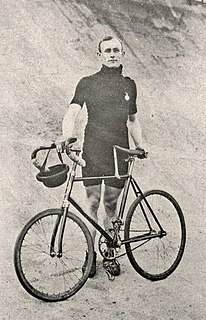Emil Lewanow

|
|
| Emil Lewanow (1919) | |
| To person | |
|---|---|
| Date of birth | September 3, 1898 |
| date of death | November 8, 1935 |
| nation |
|
| discipline | train |
| End of career | 1929/30 |
| Last updated: October 9, 2018 | |
Emil Lewanow (born September 3, 1898 in Unruhstadt ; † November 8, 1935 in Berlin ) was a German racing cyclist who was mainly active on the track .
Athletic career
Emil Lewanow learned the trade of locksmith, in 1914 he became a professional racing cyclist. Initially, he worked as a "flier" (former name for sprinter ). In this discipline he was able to achieve some success, which was also due to the fact that many racing drivers had been drafted as soldiers. So he beat the world champion Willy Arend . In 1915 he switched to the standing race and in 1916 he contested his first race in the discipline. In the autumn of that year he was drafted, but after he had been transferred to the Airplane Replacement Department in Döberitz , he was able to race again.
In 1921 and 1922 Lewanow won the “Grand Prix of Berlin” and in 1926 was German vice-champion of the stayers behind Karl Wittig . In July 1923 he fell so badly during a race in Amsterdam that he was unconscious for several hours, and his death was already reported. Until 1929 he won numerous "Grand Prizes" as a stayer and in around 1927 he was ranked fourth in the statistics of the most successful German stayers. He competed in nine six-day races : in 1919 he was third with Otto Pawke and third in 1924 with Walter Rütt in Berlin, and second with Rütt in 1926 in Dortmund . He also acted as a pacemaker . On June 1, 1927, he and his friend Franz Krupkat fell during a race in Leipzig , and Krupkat succumbed to his injuries. The Corona-Werke named a track bike model after him and Walter Sawall : “No. 102 Lewanow-Sawall ".
The Berlin cycling journalist Fredy Budzinski wrote about Lewanow: “A racing driver without temperament is like soup without salt, but Lewanow's temperament has often let off steam in the wrong direction and forfeited many friends from him, but the appealing driving style and daring in a good mood tore the cycling friends away again and again, and Lewanow always had a large number of fans. "
Lewanow earned very well in the lucrative standing races, but was addicted to games and frequented dodgy circles, where he spent too much money, as the journalist Fredy Budzinski complained. In 1930, after another serious fall, he ended his cycling career and opened a restaurant in Berlin. In 1934 he was registered in Berlin-Schöneberg at Maaßenstrasse 11. In November 1935 he committed suicide using gas; The reason is said to have been a serious illness. It shouldn't have been his first suicide attempt.
literature
- Hans Borowik : 300 racing drivers in one volume . Deutscher Schriftenverlag, Berlin 1937, p. 33 .
- Fredy Budzinski : Fate of racing drivers. Happiness, splendor and the end of the heroes off the pedal - Emil Lewanow . In: Illustrated cycling sport . Deutscher Sport-Verlag Kurt Stoof, Berlin November 15, 1935, p. 2-3 .
Web links
- Emil Lewanow in the Radsportseiten.net database
- Emil Lewanow on cycling4fans.de
Individual evidence
- ^ German newspaper in the Netherlands , October 12, 1942.
- ↑ Mario Steinbrink: On the history of Corona-Fahrradwerke and Metallindustrie AG Brandenburg / Havel . In: The bone shaker. Magazine for lovers of historic bicycles . No. 54 , 2012, p. 7/8 .
- ↑ Emil Lewanow on cycling4fans.de
- ↑ a b Budzinski: Lewanow , p. 3.
- ^ Nieuwe Tilburgsche Courant , November 11, 1935.
- ↑ Lewanow, Emil . In: Berliner Adreßbuch , 1934, part 1, p. 1476.
- ^ Sumatra Post , November 15, 1935.
| personal data | |
|---|---|
| SURNAME | Lewanow, Emil |
| BRIEF DESCRIPTION | German racing cyclist |
| DATE OF BIRTH | September 3, 1898 |
| PLACE OF BIRTH | Balance city |
| DATE OF DEATH | November 8, 1935 |
| Place of death | Berlin |